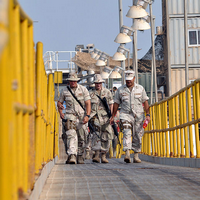In a two-round bidding procedure that concluded in mid-December, the international oil industry regained access to Iraq's upstream resources for the first time since the 1975 nationalization, with service contracts awarded for the development of 13 major fields. Although some critics denounced the deals as a sell-off of Iraq's resources to foreigners, Iraqi Oil Minister Husain al-Shahristani negotiated very good terms for them. Production will rise from the current 2.5 million barrels per day (mbpd) to 12 mbpd, and Iraq will be in control of every drop of oil extracted on payment of fees amounting to only $1 to $1.50 per barrel. (The fees for three very challenging fields were set at $5 to $6 per barrel.)
Also remarkable was the transparency of the process through which contracts were awarded, with oil companies openly bidding for fields and details of the deals made public. Given Iraq's extremely fragile security situation, the parliament's inability to pass a comprehensive petroleum law and the uncertainty about rent-sharing arrangements between the central government and the northern Kurdish Regional Authority, it is difficult to imagine the Iraqi petroleum sector achieving a better outcome.
There are obviously high expectations about the revenue these contracts will provide. If well-managed, oil monies may be enough to pay for the country's post-war reconstruction and guarantee opportunities and decent living standards for the Iraqi population. However, Iraq's dramatic comeback as the world's second-largest oil producer is upsetting other market players -- in particular within OPEC, of which Iraq is still technically a member.

